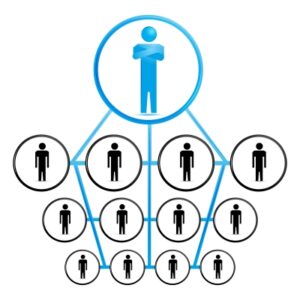net·work·ing
[net-wur-king]
noun 1. a supportive system of sharing information and services among individuals and groups having a common interest.
As a job-seeker, building a network is important. For an executive, it’s critical. Networking enables you to build and maintain connections that may well be the bridge to your next leadership role. Networking well is a learned skill that goes above and beyond simply making contacts, it’s effectively connecting with people so they remember you in the future when they become aware of an opportunity for which you may be a great fit.
Fellow NRWA member Gail Frank of CallFranklySpeaking wrote an article entitled Build a Network Before You Need One which encourages executives to reach out to their sphere of influence before it becomes necessary to seek a new position (whether voluntary or prompted by outside circumstances). Executive Resumes Atlanta would like to share this article, to provide insight into the importance of building a continuous network, even when you’re not actively looking for a new opportunity.
Build a Network Before You Need One 
By Gail Frank, CallFranklySpeaking
As Barbra Streisand sings, “People….people who need people…are the luckiest people…”
If you found yourself suddenly out of work, faced with empty days and the challenge of finding a new job, what would you do? Who could you call? In short, do you have a professional network of contacts ready to help?
WHY DO YOU NEED A NETWORK NOW?
If you think you are not in jeopardy of losing your job, think again. According to a recent survey by outplacement firm Lee Hecht Harrison, 50% of professionals laid off in recent months were caught unaware by the shocking news.
In these times of economic uncertainty and corporate scandal, virtually every worker needs a solid core of professional sources to tap in the event of sudden unemployment.
WHAT IS NETWORKING? (AND WHAT GIVES IT A BAD NAME?)
“Networking” is not a dirty word. However it has developed a bad reputation due to misuse by unskilled, insincere and needy people. We’ve all been in situations where someone who is “networking” is clearly desperate for our money, business, patronage, referrals or input. It makes us uncomfortable.
In spite of this, at least 60% of all new jobs are uncovered through people power—networking at its best. Indeed, that is the definition: casting a wide web or “net” and “working” it to the benefit of all members.
True and successful networking is all about relationship building. Your network of contacts can be an effective sales force and referral base for you…as long as you build sincere relationships.
PRINCIPLES OF SUCCESSFUL PROFESSIONAL NETWORKING
Luckily, you can learn to become an outstanding networker, and grow your own safety net. Follow the 4 Golden Rules for Networking:
1) “Givers gain.” Help people, and they in turn will want to help you. Focus on others and look for opportunities to help them without worrying what is in it for you.
2) Don’t confuse “great” networking with “effective” networking. Everyone knows a “great” networker—they seem to know everyone! However, knowing people and being effective in helping others build their business are not the same thing. Effective networkers deliver business results.
3) Be sincere. Nothing is worse than a person who offers help in order to get something in return. People can sense when they are being used. This is why it is easier to build a network before you need one; then you really can be genuine in your willingness to help others without needing anything in return right away.
4) Commit to spending the energy. Networks do not suddenly appear. Because they are built on relationships and shared experiences, they need attention, time and nurturing to blossom.
STEPS TO CREATE YOUR NETWORK NOW!
1) Evaluate the strength of your current network. List your contacts: all the people you know. Start with personal contacts: neighbors, friends, schoolmates, relatives. Don’t forget people like your doctor, dentist, lawyer, hairdresser and dry cleaner. They know everyone! Then list your professional contacts: current and former colleagues, subordinates, vendors and clients.
2) Ask yourself, “If I were laid off today, who could I call?” Develop a strategy and set some goals about who should be in your network.
3) Get involved. Mine your interests, whether you love jazz, running 5K races, homeless pets, or working in a soup kitchen. You’ll meet like-minded people and build relationships based on common values and interests.
4) Look for events and organizations in your current or desired field. Have you joined the relevant associations? Often you have chances to meet others, get information on the field, obtain a directory of members, attend conventions and local meetings, and receive professional publications and mailings.
5) Remember the important events in others’ lives. Send birthday cards or emails, clip and mail relevant articles, or send a holiday greeting with best wishes. Become the one who stays in touch with those who have impacted your life. Surprise someone you have lost touch with by dropping them a note.
6) Learn to converse comfortably. Good conversationalists know the secret is in asking questions and getting people to open up. This often leads to points of commonality and interesting discussions. Study Katie Couric and Oprah Winfrey and watch them guide conversations by asking questions and putting people at ease.
7) Look for chances to refer others to people in your professional network. When you link together people who can help one another, you help both parties plus yourself.
8) Build your 60 second commercial about your future professional direction. It might be something like, “Right now I am in real estate, but my real dream is to someday own a restaurant.” Share your goals, dreams and challenges with people you meet—you might be surprised at the response.
9) Write thank you notes. Become a great thanker. Everyone loves a thank you note, yet most people don’t bother to write them. Look for reasons to thank people, and send off a quick handwritten note.
Photo courtesy of FreeDigitalPhotos.net
